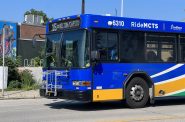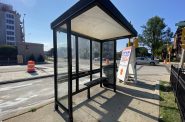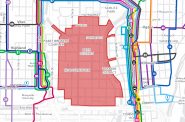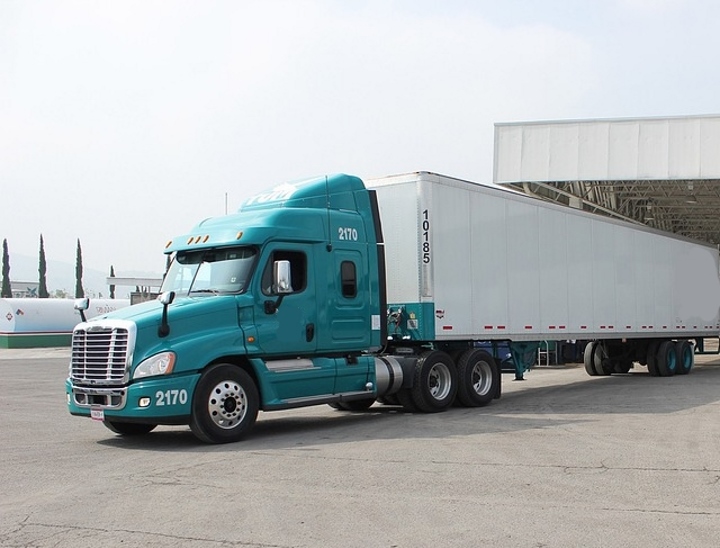GOP Considers Heavy Fees for Trucks
Trucking lobby opposes solution to transportation shortfall.
A per-mile fee on heavy trucks that could raise more than $250 million in two years has surfaced as a possible funding source to pay for Wisconsin’s transportation budget. But the trucking industry, which has contributed nearly $1.2 million to legislative and statewide candidates, opposes the plan.
Major road funding has become one of the stalemates between Assembly and Senate Republicans, who control the legislature, during their consideration of GOP Gov. Scott Walker’s proposed 2017-19 state budget. The Assembly GOP want to raise state gasoline taxes and reduce borrowing. But Walker and Senate Republicans favor borrowing and continued major road project delays because they oppose tax and vehicle registration fee increases. Walker is also leaning in favor of toll roads.
Kentucky, New York, New Mexico, and Oregon impose fees on heavy trucks, according to Rep. Amy Loudenbeck, of Clinton, who floated the truck-fee plan. If Wisconsin adopted Kentucky’s 2.85 cents per mile fee, it would raise more than $250 million for the state over two years, Loudenbeck said.
Between January 2010 and December 2016, the trucking industry contributed nearly $1.2 million in individual and political action committee contributions to Wisconsin legislative and statewide candidates. Topping the list of contributions from the trucking industry was Walker, who received about $702,600. Walker must ultimately approve the plan if lawmakers add it to his proposed 2017-19 state budget.
Trucking industry contributions to current lawmakers between January 2010 and December 2016 totaled nearly $283,000. Republicans received nearly $267,200 of those contributions. Topping the list of trucking industry contributions was GOP Rep. John Spiros, of Marshfield, about $35,760; the Committee to Elect a Republican Senate, $30,640; and the Republican Assembly Campaign Committee, $25,950. Spiros is Roehl Transport’s vice president of safety and a member of the Trucking Industry Defense Association.
Loudenbeck has received $1,100 in contributions from trucking interests.
Campaign Cash
-
Outside Groups Spent Record $28.8 Million on State Supreme Court Race
 May 7th, 2023 by Erik Gunn
May 7th, 2023 by Erik Gunn
-
Top 20 Donors to State Political Parties
 Apr 4th, 2023 by Peter Cameron and Hina Suzuki
Apr 4th, 2023 by Peter Cameron and Hina Suzuki
-
$38 Million Spent on High Court Race
 Mar 29th, 2023 by Erik Gunn
Mar 29th, 2023 by Erik Gunn
Transportation
-
MCTS Adds 28 New Buses
 Jul 13th, 2024 by Graham Kilmer
Jul 13th, 2024 by Graham Kilmer
-
MCTS Designing New Bus Shelters
 Jul 10th, 2024 by Graham Kilmer
Jul 10th, 2024 by Graham Kilmer
-
MCTS Updates RNC Bus Detours To Better Serve Downtown, Riders
 Jul 9th, 2024 by Jeramey Jannene
Jul 9th, 2024 by Jeramey Jannene























Who actually ends up paying for the heavy fees for trucks? Those fees get passed down in the form of higher prices for those who buy what’s being transported in the trucks. Why is that so difficult for Democrats to grasp? It’s a mathematical equation. Higher taxes and fees on businesses end up hurting working class people BECAUSE WE HAVE TO PAY MORE FOR THE GOODS AND SERVICES that they provide. Duh!
Trucks take up the most space on the road and, because of their weight, cause the most damage. For those reasons, they should be paying the most for maintaining the roads. A wheelbase/weight formula should be the basis to determine what the registration fee is for all vehicles, cars and trucks. The roads need to be maintained and charging based on that basis levels the playing field.
Greta Olson, you’re right on that. But that is sort of the idea, isn’t it? That means people who use the stuff that is shipped by truck and ultimately causes the most wear and tear on the roads are the ones who pay to fix the roads.
When almost any good or service is subsidized, it is over-used. Highways are no exception. Fuel taxes and registration fees cover less than 50% of direct road expenses.
We should encourage freight shippers to use rail more. Railroads are not subsidized (to the contrary, in Wisconsin, they even pay tax on every mile of track) and carry freight with far less environmental damage than highways—and at no cost to taxpayers.
Most goods travel by rail in the US. Even new cars are shipped by rail to a large rail-yard outside Chicago where they are moved onto trucks for the last few miles to Milwaukee. There is no logistical reason new cars destined for Wisconsin showrooms couldn’t be unloaded in Milwaukee instead of Chicago. (Cars bound for Chicago would still be unloaded in Chicago.) Doing this (not just for cars, but for many types of goods) might well save billions in taxpayer-borne highway reconstruction and expansion costs. But this will never happen as long as we keep subsidizing trucks (but not “greener” trains).